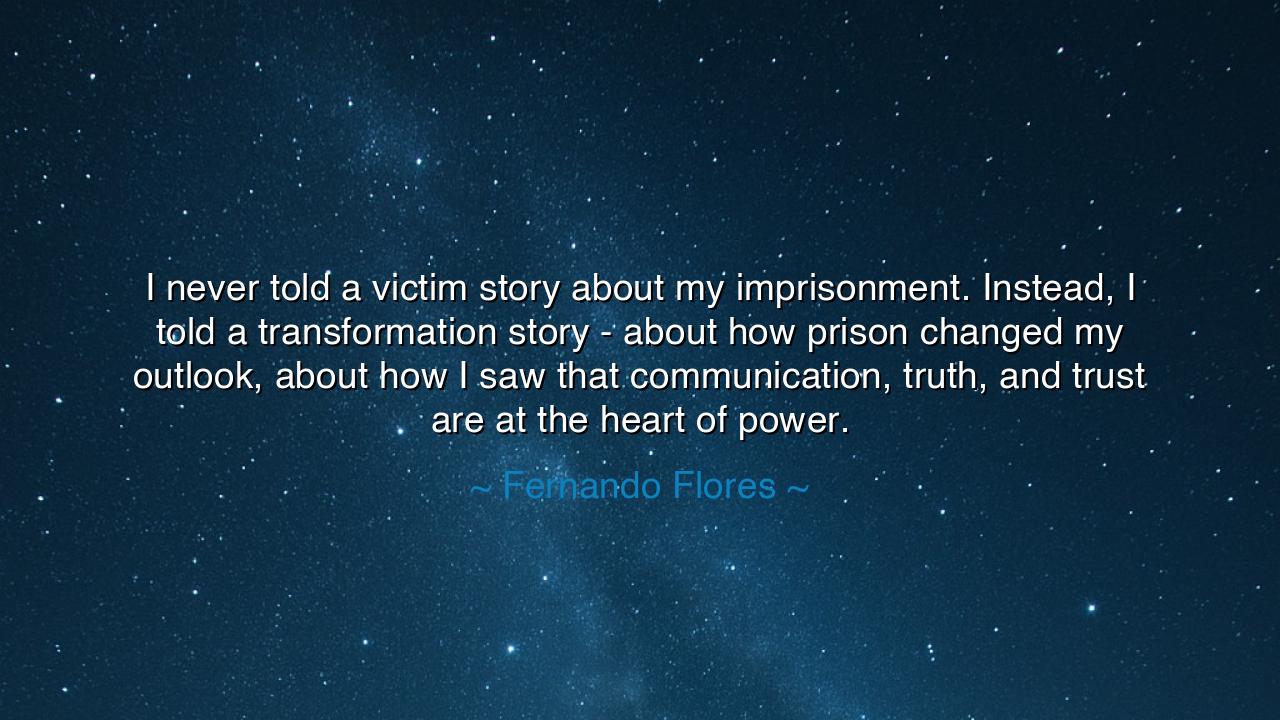
I never told a victim story about my imprisonment. Instead, I
I never told a victim story about my imprisonment. Instead, I told a transformation story - about how prison changed my outlook, about how I saw that communication, truth, and trust are at the heart of power.






Hear the voice of Fernando Flores, a man who endured the iron walls of prison yet emerged not broken but transformed, who declared: “I never told a victim story about my imprisonment. Instead, I told a transformation story – about how prison changed my outlook, about how I saw that communication, truth, and trust are at the heart of power.” In these words lies a teaching more valuable than gold, a wisdom that turns suffering itself into the forge of strength. For Flores reminds us that we cannot always choose what trials befall us, but we can choose the story we tell of them.
The meaning of his words begins here: the difference between the victim story and the transformation story. The victim story locks the soul in chains even after the body is freed, for it centers on grievance, bitterness, and the wounds of the past. But the transformation story is the tale of the phoenix—it rises from the ashes, not denying the fire, but proclaiming what was gained through it. Flores chose not to remain in the shadow of his suffering but to carry from it a torch that could light the way for himself and for others.
The ancients also understood this power. Consider the life of Boethius, imprisoned in a cold cell in the sixth century, awaiting death. He could have written only of his despair, but instead he composed The Consolation of Philosophy, a work that spoke of fate, wisdom, and the eternal order of truth. His prison became his classroom, his chains became his pen. Like Flores, he refused the story of the victim and chose the story of transformation, one that still instructs us today.
Flores also speaks of the heart of power, saying it is not domination, not fear, not wealth, but communication, truth, and trust. This, too, is wisdom forged in hardship. In prison, one sees how deception, silence, and suspicion destroy men. But in the rare moments when words are honest, when trust is shared, strength arises. Power that rests on violence is fragile; power that rests on truth and trust is enduring. To understand this is to grasp the deeper laws of human life.
History gives us another example: Nelson Mandela. For twenty-seven years he suffered in Robben Island prison. Yet when he emerged, he did not tell only of injustice; he told of vision, of transformation, of reconciliation. He too had seen that true power was not vengeance but the ability to build bridges of trust and to speak words of truth that could heal a wounded nation. In this, Mandela and Flores share the same insight: the transformation story gives birth to real power.
The lesson for us is plain. Each of us will face trials—perhaps not imprisonment, but betrayal, loss, or failure. In those moments, we will be tempted to tell the victim story, to dwell upon the wrongs done to us. But if we are wise, we will choose instead the transformation story: to ask what we learned, how we grew, and what new strength was born in us. By doing so, we turn wounds into wisdom and chains into tools of freedom.
Therefore, remember Flores’s wisdom: “Communication, truth, and trust are at the heart of power.” Do not waste your suffering by binding yourself in the chains of grievance. Instead, shape it into a story of transformation that can guide others. Speak truthfully, build trust, and let your words be bridges rather than weapons. In this way, your trials will not only refine you, but they will give you the only power worth having—the power to bring light where once there was only darkness.






TLDuc Tho le
I admire how Fernando Flores frames his imprisonment as a catalyst for change rather than a sentence of despair. It makes me think about how we, as a society, often view the incarcerated. Are we quick to define them by their past mistakes, or do we offer room for transformation? This mindset could challenge our collective assumptions about people in prison and encourage a deeper understanding of human potential, regardless of the circumstances.
PNDieu Phuong Nguyen
The concept of telling a ‘transformation story’ instead of a ‘victim story’ is intriguing. It makes me wonder if people who have endured difficult experiences, like incarceration, feel pressured to portray themselves as either victims or heroes. Is there a middle ground? How can society support people in finding their own stories of growth and empowerment, rather than reinforcing narratives that focus solely on suffering and loss?
NGNguyen Green
Flores’ perspective on communication, truth, and trust as the essence of power strikes me as profound. It makes me think about how often we overlook the transformative power of these elements in everyday life. Could we apply this mindset outside of extreme situations like imprisonment? How can we cultivate trust and truth in our own relationships and communities? I’m curious whether this philosophy would work for people in less challenging environments as well.
ADNguyen Hoang Anh Dung
This quote really resonates with me. It’s remarkable how Fernando Flores shifted from a victim mindset to one of empowerment. The idea that prison could be a space for transformation rather than just suffering is fascinating. I wonder, though, how many people truly see imprisonment as an opportunity for self-reflection and growth? Or does the system typically strip individuals of that possibility? It would be interesting to explore how others in similar circumstances perceive their time behind bars.